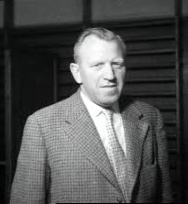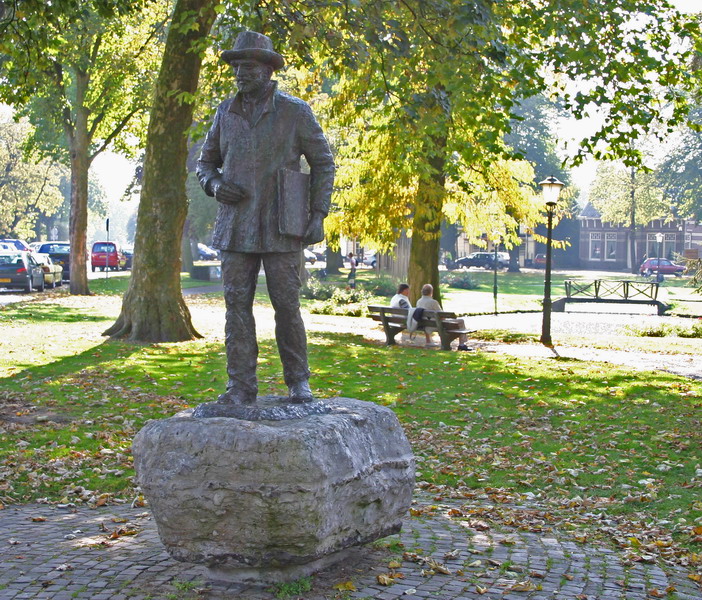|
Communist Unity Movement Of The Netherlands (Marxist–Leninist)
Communist Unity Movement of the Netherlands (marxist-leninist) (; KEN (ml)) was a communist organization in the Netherlands founded in 1964. History The organization started as a pro-China leftist faction within the Communist Party of the Netherlands in 1964. At that time, it called itself Marxist-Leninist Centre (''Marxistisch-Leninistisch Centrum'') and transpired by the Communist Party section 33 in Blijdorp, Rotterdam. Leading figures (in an organization of only a handful of members) were Nico Schrevel and Daan Monjé. MLC ( Marxist-Leninist Centre ) started publishing the magazine, ''Spartacus''. Before the 21st CPN party congress, MLC issued the appeal 'For the Unity of the Communist Movement'. At the end of 1964, the CPN leadership expelled Schrevel and Monjé. At this time, MLC was one of two pro-Chinese factions expelled from the CPN. The other was assembled around the periodical League of Dutch Marxist-Leninists, ''Rode Vlag''. Plans for a merger stalled, as the ''Rode ... [...More Info...] [...Related Items...] OR: [Wikipedia] [Google] [Baidu] |
Communist Party Of The Netherlands
The Communist Party of the Netherlands (, , CPN) was a communist party in the Netherlands. The party was founded in 1909 as the Social Democratic Party (Netherlands), Social Democratic Party (SDP) and merged with the Pacifist Socialist Party, the Political Party of Radicals and the Evangelical People's Party (Netherlands), Evangelical People's Party in 1991, forming the GroenLinks. Members opposed to the merger founded the New Communist Party of the Netherlands. History Foundation In 1907, Jan Ceton, Willem van Ravesteyn, and David Wijnkoop of the Social Democratic Workers' Party (Netherlands), Social Democratic Workers' Party (SDAP) founded ' ("The Tribune"), a magazine in which they criticized the party leadership. They maintained orthodox Marxism, Marxist views and expected a proletarian revolution. They opposed the leadership of the SDAP, who were more oriented towards more a Marxist revisionism, revisionist ideology and a parliamentary and reformism, reformist political stra ... [...More Info...] [...Related Items...] OR: [Wikipedia] [Google] [Baidu] |
Red Youth (Netherlands)
Red Youth () was a communist organization in the Netherlands. It originated in the group around the periodical ''Rode Jeugd'', which had been started by the pro-China '' Rode Vlag''-grouping in 1966. In October 1967 the group around ''Rode Jeugd'' broke away, and formed their own organisation, Red Youth. The group was most active in the city of Eindhoven. They also used the names ''Revolutionair Volksverzet Nederland'' (Revolutionary People's Resistance Netherlands, RVN) and ''Philips Griekenland Aktiegroep'' (Philips Greece Action Group) as public cover names for "illegal" actions. (born 1950) became the national secretary of Red Youth. Inside Red Youth two wings emerged. On one side stood the 'terrorists', who were inspired by the West German Red Army Faction (''Rote Armee Fraktion'', RAF) and who saw the strategy of urban guerrilla warfare as a path to follow to overthrow capitalism, and on the other the 'economists', who wanted to focus on socioeconomic struggles. After the R ... [...More Info...] [...Related Items...] OR: [Wikipedia] [Google] [Baidu] |
Defunct Communist Parties In The Netherlands
{{Disambiguation ...
Defunct may refer to: * ''Defunct'' (video game), 2014 * Zombie process or defunct process, in Unix-like operating systems See also * * :Former entities * End-of-life product * Obsolescence Obsolescence is the process of becoming antiquated, out of date, old-fashioned, no longer in general use, or no longer useful, or the condition of being in such a state. When used in a biological sense, it means imperfect or rudimentary when comp ... [...More Info...] [...Related Items...] OR: [Wikipedia] [Google] [Baidu] |
NATO
The North Atlantic Treaty Organization (NATO ; , OTAN), also called the North Atlantic Alliance, is an intergovernmental organization, intergovernmental Transnationalism, transnational military alliance of 32 Member states of NATO, member states—30 European and 2 North American. Established in the aftermath of World War II, the organization implements the North Atlantic Treaty, signed in Washington, D.C., on 4 April 1949. NATO is a collective security system: its independent member states agree to defend each other against attacks by third parties. During the Cold War, NATO operated as a check on the threat posed by the Soviet Union. The alliance remained in place after the dissolution of the Soviet Union and the Warsaw Pact, and has been involved in military operations in the Balkans, the Middle East, South Asia, and Africa. The organization's motto is . The organization's strategic concepts include Deterrence theory, deterrence. NATO headquarters, NATO's main headquarter ... [...More Info...] [...Related Items...] OR: [Wikipedia] [Google] [Baidu] |
Group Of Marxist-Leninists/Red Dawn
A group is a number of persons or things that are located, gathered, or classed together. Groups of people * Cultural group, a group whose members share the same cultural identity * Ethnic group, a group whose members share the same ethnic identity * Religious group (other), a group whose members share the same religious identity * Social group, a group whose members share the same social identity * Tribal group, a group whose members share the same tribal identity * Organization, an entity that has a collective goal and is linked to an external environment * Peer group, an entity of three or more people with similar age, ability, experience, and interest * Class (education), a group of people which attends a specific course or lesson at an educational institution Social science * In-group and out-group * Primary, secondary, and reference groups * Social group * Collectives Philosophy and religion * Khandha, a Buddhist concept of five material and mental factors ... [...More Info...] [...Related Items...] OR: [Wikipedia] [Google] [Baidu] |
Communist Circle Of Breda (Marxist-Leninist)
Communism () is a sociopolitical, philosophical, and economic ideology within the socialist movement, whose goal is the creation of a communist society, a socioeconomic order centered on common ownership of the means of production, distribution, and exchange that allocates products in society based on need.: "One widespread distinction was that socialism socialised production only while communism socialised production and consumption." A communist society entails the absence of private property and social classes, and ultimately money and the state. Communists often seek a voluntary state of self-governance but disagree on the means to this end. This reflects a distinction between a libertarian socialist approach of communization, revolutionary spontaneity, and workers' self-management, and an authoritarian socialist, vanguardist, or party-driven approach to establish a socialist state, which is expected to wither away. Communist parties have been described as radical lef ... [...More Info...] [...Related Items...] OR: [Wikipedia] [Google] [Baidu] |
North Brabant
North Brabant ( ; ), also unofficially called Brabant, Dutch Brabant or Hollandic Brabant, is a province in the south of the Netherlands. It borders the provinces of South Holland and Gelderland to the north, Limburg to the east, Zeeland to the west, and the Flemish provinces of Antwerp and Limburg to the south. The northern border follows the Meuse westward to its mouth in the Hollands Diep strait, part of the Rhine–Meuse–Scheldt delta. North Brabant had a population of about 2,626,000 as of January 2023. Major cities in North Brabant are Eindhoven (pop. 231,642), Tilburg (pop. 217,259), Breda (pop. 183,873), its provincial capital 's-Hertogenbosch (pop. 154,205), and Helmond (pop. 94,967) History The Duchy of Brabant was a state of the Holy Roman Empire established in 1183 or 1190. It developed from the Landgraviate of Brabant and formed the heart of the historic Low Countries, part of the Burgundian Netherlands from 1430 and of the Habsburg Netherlands f ... [...More Info...] [...Related Items...] OR: [Wikipedia] [Google] [Baidu] |
Communist Circle Of Rijnmond (Marxist-Leninist)
Communism () is a sociopolitical, philosophical, and economic ideology within the socialist movement, whose goal is the creation of a communist society, a socioeconomic order centered on common ownership of the means of production, distribution, and exchange that allocates products in society based on need.: "One widespread distinction was that socialism socialised production only while communism socialised production and consumption." A communist society entails the absence of private property and social classes, and ultimately money and the state. Communists often seek a voluntary state of self-governance but disagree on the means to this end. This reflects a distinction between a libertarian socialist approach of communization, revolutionary spontaneity, and workers' self-management, and an authoritarian socialist, vanguardist, or party-driven approach to establish a socialist state, which is expected to wither away. Communist parties have been described as radical lef ... [...More Info...] [...Related Items...] OR: [Wikipedia] [Google] [Baidu] |
National Vietnam Committee
National may refer to: Common uses * Nation or country ** Nationality – a ''national'' is a person who is subject to a nation, regardless of whether the person has full rights as a citizen Places in the United States * National, Maryland, census-designated place * National, Nevada, ghost town * National, Utah, ghost town * National, West Virginia, unincorporated community Commerce * National (brand), a brand name of electronic goods from Panasonic * National Benzole (or simply known as National), former petrol station chain in the UK, merged with BP * National Book Store, a bookstore and office supplies chain in the Philippines * National Car Rental, an American rental car company * National Energy Systems, a former name of Eco Marine Power * National Entertainment Commission, a former name of the Media Rating Council * National Motor Vehicle Company, Indianapolis, Indiana, USA 1900–1924 * National Radio Company, Malden, Massachusetts, USA 1914–1991 * National Supermarket ... [...More Info...] [...Related Items...] OR: [Wikipedia] [Google] [Baidu] |
Tilburg
Tilburg () is a List of cities in the Netherlands by province, city and List of municipalities of the Netherlands, municipality in the Netherlands, in the southern Provinces of the Netherlands, province of North Brabant. With a population of 229,833 (January 2, 2024), it is the second-largest city or municipality in North Brabant after Eindhoven and the seventh-largest in the Netherlands. Tilburg University is located in Tilburg, as are Avans University of Applied Sciences and Fontys University of Applied Sciences. There are three railway stations within the municipality: Tilburg railway station, Tilburg, Tilburg Universiteit railway station, Tilburg Universiteit and Tilburg Reeshof railway station, Tilburg Reeshof. The "Spoorzone" area around Tilburg Central station, once a Dutch Railways train maintenance yard, has been purchased by the city and is being transformed into an urban zone. History Little is known about the beginnings of Tilburg. The name ''Tilliburg'' fi ... [...More Info...] [...Related Items...] OR: [Wikipedia] [Google] [Baidu] |
Socialist Party (Netherlands)
The Socialist Party ( ; SP ) is a democratic socialist political party in the Netherlands. Founded in 1971 as the Communist Party of the Netherlands/Marxist–Leninist (KPN/ML, ), the party has since moderated itself from Marxism–Leninism and Maoism towards democratic socialism and social democracy. Positioned to the Left-wing politics, political left of the Labour Party (Netherlands), Labour Party, the party has been part of the parliamentary opposition since it was formed. After the 2006 Dutch general election, the SP became one of the major parties of the Netherlands winning 25 out of 150 parliamentary seats, an increase of 16 seats. In the 2010 Dutch general election, the parliamentary presence of the socialists decreased to 15 seats. In the 2012 Dutch general election, the party maintained those 15 seats. Following the 2017 Dutch general election, 2017 and 2021 Dutch general election, 2021 general elections, the SP fell back to the nine seats it held before 2006. After the ... [...More Info...] [...Related Items...] OR: [Wikipedia] [Google] [Baidu] |




